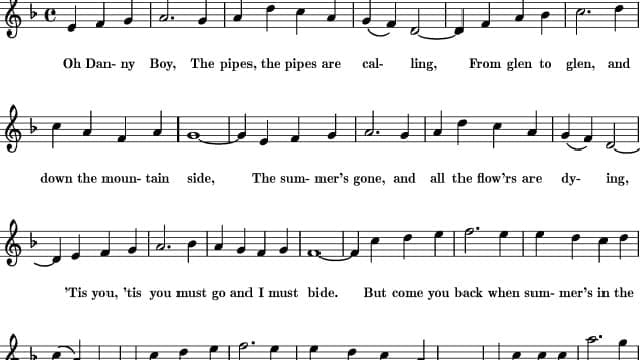The fascinating origins and emotional depth of the classic Danny Boy song
 Watching the television broadcast of former prime minister Brian Mulroney’s state funeral, I was reminded again of the power of the song Danny Boy. As a plangent lament expressing grief, yearning and a wistful hope for reunification, it’s difficult to match and impossible to surpass.
Watching the television broadcast of former prime minister Brian Mulroney’s state funeral, I was reminded again of the power of the song Danny Boy. As a plangent lament expressing grief, yearning and a wistful hope for reunification, it’s difficult to match and impossible to surpass.
Along with its musical merit, Danny Boy has a lyrical ambiguity that very much works in its favour. The cause of separation could be war, emigration or any sort of estrangement. And the grieving narrator could be a parent, lover or friend. Rendered effectively, it fits with almost any situation involving intense loneliness, loss or sadness.
Although universally seen as a quintessential Irish song, Danny Boy actually has mixed parentage. Or at least the version most of us are familiar with does.
The melody is certainly Irish and of indeterminate age. And while there are various theories as to the composer’s identity, the only thing we can say with reasonable certainty is that Jane Ross of Limavady, County Derry, heard it played by an anonymous musician in 1851 and was sufficiently impressed to musically notate it and send it to a collector friend in Dublin. There, it was published as the Londonderry Air in Ancient Music of Ireland (1855).
| Lyrics to Danny Boy by Frederick Weatherly |
| O Danny Boy, the pipes, the pipes are calling From glen to glen, and down the mountain side. The summer’s gone and all the flowers are dying; ‘Tis, ’tis you must go and I must bide.But come ye back when summer’s in the meadow, Or when the valley’s hushed and white with snow. And I’ll be here in sunshine or in shadow; Oh Danny Boy, oh Danny Boy, I love you so! And if you come when all the flow’rs are dying, And I am dead, as dead I well may be. You come and find this place where I’ll be lying, Please kneel and say an Ave there for me.And I shall hear, though soft you tread above me; And all my dreams will warm and sweeter be, If you not fail to tell me that you love me; I shall sleep in peace until you come to me. But come ye back when summer’s in the meadow, |
More than a half-century later, it came to the attention of Frederick Weatherly, an English barrister who had a prolific sideline as a lyricist. Reputedly, he wrote the words to about 3,000 songs, including such classics as Roses of Picardy and The Holy City.
But after writing Danny Boy in 1910, Weatherly had trouble finding a suitable melody to attach it to, until he was rescued by his Irish-American sister-in-law sending him a copy of the Londonderry Air in 1912. While he’d never heard it before – nor, for that matter, ever set foot in Ireland – Weatherly had no trouble seeing the potential and adapted his original lyric accordingly. Thus the birth of what we now know as Danny Boy, published in 1913 and first popularised by the English soprano Elsie Griffin.
Danny Boy is a splendid example of lyric and melody fitting together in a mutually enhancing way. Others had previously taken on the task of putting words to the Londonderry Air, but it was Weatherly who knocked it out of the park.
Writing with his musicologist hat on, Mark Steyn notes how Weatherly’s lyric “taps into the essence of the music and articulates it.” The words “seem so organically tied to that tune, to the point where today it’s all but impossible to hear the music of Londonderry Air without also conjuring Danny Boy, the pipes, the glens, the sunshine and shadow and all the other marvellous imagery.”
Weatherly himself had no doubts about what was required: “Why is it that songs appeal? Is there not a story in each? A melody which remains – deep down in our hearts … Song and story appeal to the heart. From the heart they come and to the heart they go.”
Since it was first recorded in 1915, Danny Boy has been sung by all sorts of people and all sorts of voices – male, female, tenor, soprano, baritone and whatever. Among the famous names who’ve had a go are Count John McCormack, Mario Lanza, Bing Crosby, Judy Garland, Paul Robeson, Harry Belafonte, Elvis Presley, Tom Jones and Johnny Cash. There was even a controversially raucous rock ‘n’ roll version from Conway Twitty that reached the American Top 10 in 1959 but was banned by the BBC!
Not all renditions have been equally successful. For instance, I didn’t much care for the treatment delivered by The Tenors quartet at the Mulroney funeral, finding it way too contrived.
To me, Danny Boy is a song best done simply. It needs no elaboration, whether vocal or orchestral. Rather than adding something positive, artifice merely distracts from the inherent strength of the material.
My favourite version comes from the debut album of the Scots-Canadian John McDermott, a tenor with Irish heritage on both sides of his family tree. Titled Danny Boy and first released in 1992, the album actually has two takes of the song, one with musical accompaniment and the other with just voice. It’s the second – placed as the album’s last track – that really does it for me.
If you’ve never heard it, it’s worth checking out.
Troy Media columnist Pat Murphy casts a history buff’s eye at the goings-on in our world. Never cynical – well, perhaps a little bit.
For interview requests, click here.
The opinions expressed by our columnists and contributors are theirs alone and do not inherently or expressly reflect the views of our publication.
© Troy Media
Troy Media is an editorial content provider to media outlets and its own hosted community news outlets across Canada.


